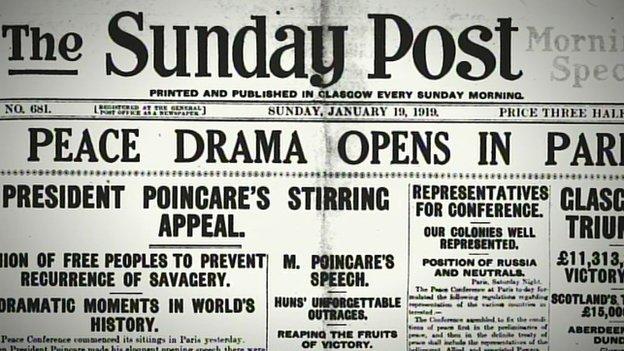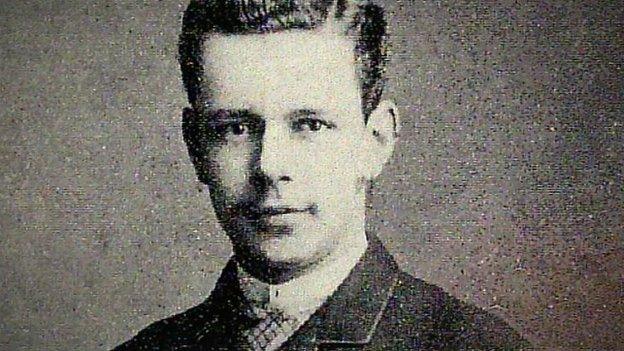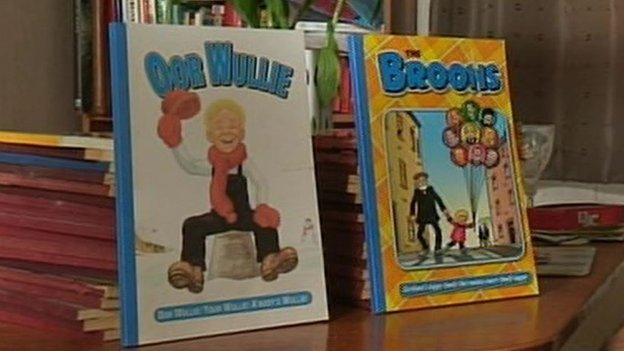Jings, Crivvens! The Sunday Post newspaper turns 100
- Published

The paper was originally launched as a wartime Sunday edition of the Saturday Post
The Sunday Post, the Scottish family newspaper once named the most successful in the world by the Guinness Book of Records, is celebrating its 100th anniversary.
The Post is in every sense a family paper.
Besides its small-C conservative outlook, iconic cartoon strips and folksy columns, the paper was the creation of DC Thomson, the family firm behind the third J in Dundee's famed trio of jute, jam and journalism.
It was born out of a thirst for news brought on by the outbreak of World War One, as many local men headed off to fight on the front lines.
The Thomson family had made their fortune in the international shipping industry before branching out into publishing with the purchase of the Dundee Courier and Argus in 1866.
In 1884, 23-year-old David Coupar Thomson was put in charge of the family's growing publishing interests, and in 1905 DC Thomson and Company was set up to publish newspapers.

David Coupar Thomson was put in charge of the Thomson family's publishing interests aged just 23
Although it was home to the daily Courier and Evening Telegraph titles, at the outbreak of war DC Thomson didn't have a Sunday paper.
So to serve the insatiable daily appetite for news of the war effort, a special Sunday edition of the existing Saturday Post was established in 1914.
'Fighter writers'
The fourth battalion of the Black Watch was Dundee's own regiment, and was made up primarily of men who had worked in the three Js - including hundreds from DC Thomson.
With many of their own men serving in the trenches, the firm's newspapers were ideally placed to report on the war, with eye-witness accounts from the "fighter writers" sent back from foreign battlefields.
Even David Thomson himself took his chauffeur and car across to France to visit the front and send back reports.
The "Sunday Special" edition was intended to last for the duration of the war.
But the strength of its journalism and appeal was such that it continued on as a fully-fledged paper of its own, with the first edition of the new Sunday Post hitting the streets on 19 January 1919.

DC Thomson and the Sunday Post are based in Dundee to this day

DC Thomson has a home on London's famed Fleet Street as well as its traditional base in Dundee
Despite falling out with some socialists when Thomson cracked down on trade union membership after the General Strike of 1926, the Post grew to become one of the country's most popular papers.
Perhaps in response to the collapse of the jute industry at the turn of the "Hungry Thirties" and a depression which saw unemployment in Scotland soar to 28%, the Post launched a "fun section" which produced the paper's most enduring characters.
Created by artist Dudley D. Watkins, Oor Wullie and the Broons made their debut in the first fun section in March 1936, and have been there ever since.
Help mah boab!
"Every Scot was aware of Oor Wullie, through the Post, through his Christmas annuals, everybody knew it," says Morris Heggie, editor of the comics.
"'Jings, crivvens, help mah boab' became part of the Scottish language, part of the dialect."
The comics were beloved not just by youngsters, but their parents too.
Post columnist Lorraine Kelly remembers her proudest moment not as the day she was awarded an OBE, but when the event was featured in that week's Oor Wullie cartoon.
Editor Donald Martin says the characters remain a "huge, huge asset" to this day, with Wullie's likeness adorning the exterior of the Kingsway premises where the paper is printed, alongside fellow DC Thomson comic creations Dennis the Menace and Desperate Dan.

Oor Wullie and the Broons became national favourites through the paper and their Christmas annuals
The characters even got involved with the war effort when World War Two broke out in 1939, with Wullie setting up a shy featuring images of Hitler and other Nazi leaders instead of coconuts and Hen and Joe Broon enlisting.
Throughout the war, the Sunday Post became known for giving equal prominence to the headlines of the day and stories and appeals from local people.
Examples include a plea from a Clydeside mother of four for a safe place to take her children during the Blitz, and letters from wives and mothers trying to track down their loved ones.
The paper also campaigned fiercely on behalf of its readership - one long-running campaign targeted large stores of whisky in built-up areas, which it was feared could cause huge explosions if hit by a bomb.
"Eventually the editor of the paper was called to London to talk to ministers, and the warehouses were moved to outlying areas," said Norman Watson, DC Thomson historian.
"A lot of the whisky was actually moved to Canada, and one of the ships carrying it went down and became the source of Compton Mackenzie's famous 'Whisky Galore' - so you can thank the Sunday Post for that."
Glory years
By 1935 the paper's circulation had grown steadily to 350,000, but in the post-war years it exploded - by the turn of the 1980s it was estimated six out of ten adults in the country were readers.
At its peak the paper was named in the Guinness Book of Records as the most-read paper in the world in its circulation area, with more than 1.7m copies sold every week in a country of five million people.
However, those glory years are long gone. Competition from television, the internet and an increasingly saturated newspaper market have seen the Post's circulation fall closer to 200,000 than the millions.

DC Thomson recently completed a state of the art new printing press in Dundee
But DC Thomson remains as committed as ever. The firm recently installed a new printing press in Dundee, and has ploughed millions into upgrading the Fleet Street and Dundee Meadowside offices.
And despite sales being a shadow of their 1980s heyday, the Sunday Post is still as relevant as ever.
Last year it won the Newspaper of the Year title at the Scottish Press Awards, and also launched a new website aimed at drawing in younger readers.
Mr Martin hopes people will still be leafing through the Sunday Post another 100 years down the line.
"The future - perhaps it will all be online, but I'd rather it wasn't," he said.
"I'm a newspaper man through and through, and I'd like to think there's still a place for newspapers, and even in the next 100 years you'll still be able to pick up a Sunday Post.
"There's nothing that beats that feeling of having a newspaper in your hand."
- Published10 November 2013
